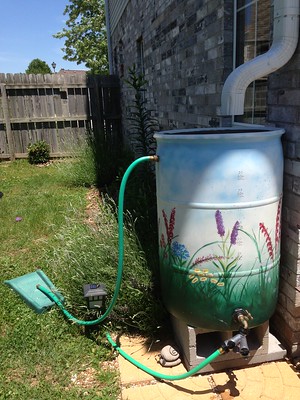Are You Considering a Rain Barrel to Water Your Garden?
Can I water my yard and plants with water I collect in a rain barrel?

Nashville, Ark. – Rain barrels are a great way to save on water expense and conserve water as well. If you are looking for alternate ways to water your lawn or ornamentals, then rain barrels are an option for you. However, they are not ideal for watering your fruits and vegetables. It has been proven that some rain barrels contain chemicals and pathogens due to runoff or from growth over time.
Different roofing material play a role in what is going into your rain barrel that could cause harm if used on fruits or vegetables. Chemical reactions can happen causing harmful substance to end up in your barrel. Rain barrels are also a catch all for different types of pathogens, such as bacteria, viruses, and parasites from different types of animal waste (especially bird droppings).
If you are going to use your rain barrel to water fruits and vegetables, do not water the plant itself. Try to get as little contact to the plant directly. If contact is made, it can cause chemical or pathogenic contamination.
It is very important to always remember to clean your produce no matter where your water source is coming from. Be sure and use a scrubbing brush on tough skin fruits and vegetables to get them clean.
For more information on how to build your very own rain barrel check out our website at www.uaex.uada.edu. In the search box be sure and search for how to build your own rain barrel or call your local extension office for more information.
By Samantha Horn
County Extension Agent - Agriculture
The Cooperative Extension Service
U of A System Division of Agriculture
Media Contact: Samantha Horn
County Extension Agent - Agriculture
U of A Division of Agriculture
Cooperative Extension Service
421 N. Main Nashville AR 71852
(870) 845-7517
shorn@uada.edu
The Arkansas Cooperative Extension Service is an equal opportunity institution. If
you require a reasonable accommodation to participate or need materials in another
format, please contact your County Extension office (or other appropriate office)
as soon as possible. Dial 711 for Arkansas Relay.
Pursuant to 7 CFR § 15.3, the University of Arkansas System Division of Agriculture
offers all its Extension and Research programs and services (including employment)
without regard to race, color, sex, national origin, religion, age, disability, marital
or veteran status, genetic information, sexual preference, pregnancy or any other
legally protected status, and is an equal opportunity institution.